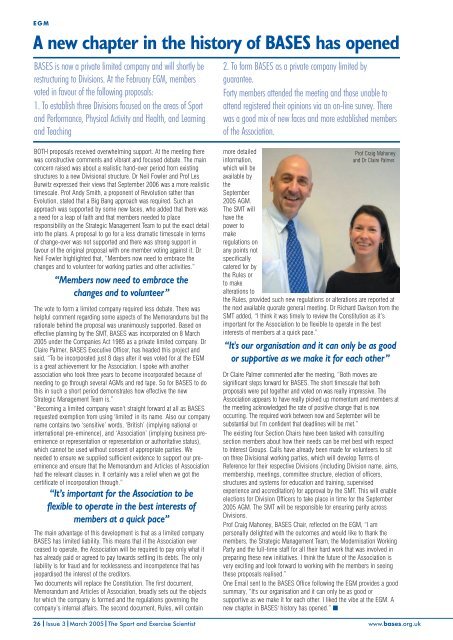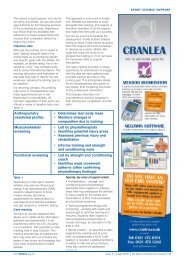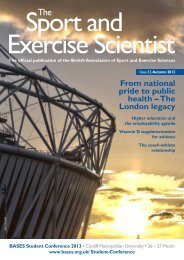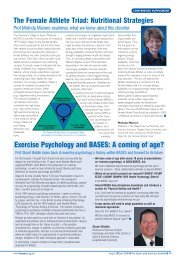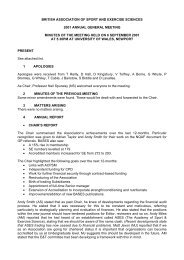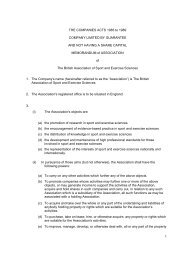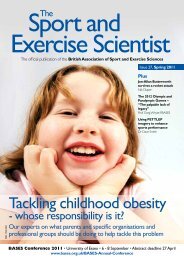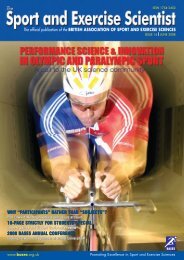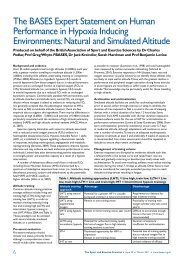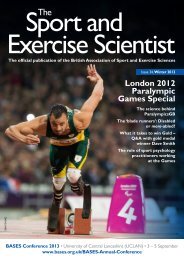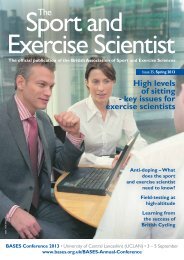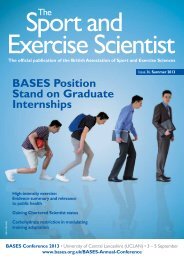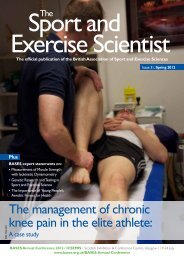Issue 3 March 2005 - BASES
Issue 3 March 2005 - BASES
Issue 3 March 2005 - BASES
You also want an ePaper? Increase the reach of your titles
YUMPU automatically turns print PDFs into web optimized ePapers that Google loves.
EGM<br />
A new chapter in the history of <strong>BASES</strong> has opened<br />
<strong>BASES</strong> is now a private limited company and will shortly be<br />
restructuring to Divisions. At the February EGM, members<br />
voted in favour of the following proposals:<br />
1. To establish three Divisions focused on the areas of Sport<br />
and Performance, Physical Activity and Health, and Learning<br />
and Teaching<br />
2. To form <strong>BASES</strong> as a private company limited by<br />
guarantee.<br />
Forty members attended the meeting and those unable to<br />
attend registered their opinions via an on-line survey. There<br />
was a good mix of new faces and more established members<br />
of the Association.<br />
BOTH proposals received overwhelming support. At the meeting there<br />
was constructive comments and vibrant and focused debate. The main<br />
concern raised was about a realistic hand-over period from existing<br />
structures to a new Divisional structure. Dr Neil Fowler and Prof Les<br />
Burwitz expressed their views that September 2006 was a more realistic<br />
timescale. Prof Andy Smith, a proponent of Revolution rather than<br />
Evolution, stated that a Big Bang approach was required. Such an<br />
approach was supported by some new faces, who added that there was<br />
a need for a leap of faith and that members needed to place<br />
responsibility on the Strategic Management Team to put the exact detail<br />
into the plans. A proposal to go for a less dramatic timescale in terms<br />
of change-over was not supported and there was strong support in<br />
favour of the original proposal with one member voting against it. Dr<br />
Neil Fowler highlighted that, “Members now need to embrace the<br />
changes and to volunteer for working parties and other activities.”<br />
“Members now need to embrace the<br />
changes and to volunteer”<br />
The vote to form a limited company required less debate. There was<br />
helpful comment regarding some aspects of the Memorandums but the<br />
rationale behind the proposal was unanimously supported. Based on<br />
effective planning by the SMT, <strong>BASES</strong> was incorporated on 8 <strong>March</strong><br />
<strong>2005</strong> under the Companies Act 1985 as a private limited company. Dr<br />
Claire Palmer, <strong>BASES</strong> Executive Officer, has headed this project and<br />
said, “To be incorporated just 8 days after it was voted for at the EGM<br />
is a great achievement for the Association. I spoke with another<br />
association who took three years to become incorporated because of<br />
needing to go through several AGMs and red tape. So for <strong>BASES</strong> to do<br />
this in such a short period demonstrates how effective the new<br />
Strategic Management Team is.”<br />
“Becoming a limited company wasn’t straight forward at all as <strong>BASES</strong><br />
requested exemption from using 'limited' in its name. Also our company<br />
name contains two ‘sensitive’ words, ‘British’ (implying national or<br />
international pre-eminence), and ‘Association’ (implying business preeminence<br />
or representation or representation or authoritative status),<br />
which cannot be used without consent of appropriate parties. We<br />
needed to ensure we supplied sufficient evidence to support our preeminence<br />
and ensure that the Memorandum and Articles of Association<br />
had the relevant clauses in. It certainly was a relief when we got the<br />
certificate of incorporation through.”<br />
“It’s important for the Association to be<br />
flexible to operate in the best interests of<br />
members at a quick pace”<br />
The main advantage of this development is that as a limited company<br />
<strong>BASES</strong> has limited liability. This means that if the Association ever<br />
ceased to operate, the Association will be required to pay only what it<br />
has already paid or agreed to pay towards settling its debts. The only<br />
liability is for fraud and for recklessness and incompetence that has<br />
jeopardised the interest of the creditors.<br />
Two documents will replace the Constitution. The first document,<br />
Memorandum and Articles of Association, broadly sets out the objects<br />
for which the company is formed and the regulations governing the<br />
company’s internal affairs. The second document, Rules, will contain<br />
26 <strong>Issue</strong> 3 <strong>March</strong> <strong>2005</strong> The Sport and Exercise Scientist<br />
more detailed<br />
information,<br />
which will be<br />
available by<br />
the<br />
September<br />
<strong>2005</strong> AGM.<br />
The SMT will<br />
have the<br />
power to<br />
make<br />
regulations on<br />
any points not<br />
specifically<br />
catered for by<br />
the Rules or<br />
to make<br />
alterations to<br />
Prof Craig Mahoney<br />
and Dr Claire Palmer.<br />
the Rules, provided such new regulations or alterations are reported at<br />
the next available quorate general meeting. Dr Richard Davison from the<br />
SMT added, “I think it was timely to review the Constitution as it’s<br />
important for the Association to be flexible to operate in the best<br />
interests of members at a quick pace.”<br />
“It's our organisation and it can only be as good<br />
or supportive as we make it for each other”<br />
Dr Claire Palmer commented after the meeting, “Both moves are<br />
significant steps forward for <strong>BASES</strong>. The short timescale that both<br />
proposals were put together and voted on was really impressive. The<br />
Association appears to have really picked up momentum and members at<br />
the meeting acknowledged the rate of positive change that is now<br />
occurring. The required work between now and September will be<br />
substantial but I’m confident that deadlines will be met.”<br />
The existing four Section Chairs have been tasked with consulting<br />
section members about how their needs can be met best with respect<br />
to Interest Groups. Calls have already been made for volunteers to sit<br />
on three Divisional working parties, which will develop Terms of<br />
Reference for their respective Divisions (including Division name, aims,<br />
membership, meetings, committee structure, election of officers,<br />
structures and systems for education and training, supervised<br />
experience and accreditation) for approval by the SMT. This will enable<br />
elections for Division Officers to take place in time for the September<br />
<strong>2005</strong> AGM. The SMT will be responsible for ensuring parity across<br />
Divisions.<br />
Prof Craig Mahoney, <strong>BASES</strong> Chair, reflected on the EGM, “I am<br />
personally delighted with the outcomes and would like to thank the<br />
members, the Strategic Management Team, the Modernisation Working<br />
Party and the full-time staff for all their hard work that was involved in<br />
preparing these new initiatives. I think the future of the Association is<br />
very exciting and look forward to working with the members in seeing<br />
these proposals realised.”<br />
One Email sent to the <strong>BASES</strong> Office following the EGM provides a good<br />
summary, “It's our organisation and it can only be as good or<br />
supportive as we make it for each other. I liked the vibe at the EGM. A<br />
new chapter in <strong>BASES</strong>' history has opened.” ■<br />
www.bases.org.uk


